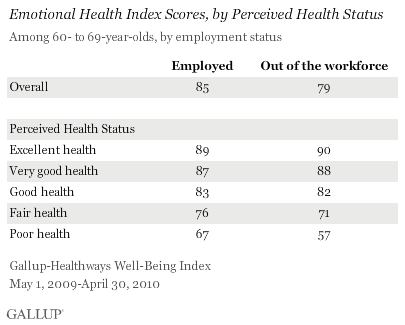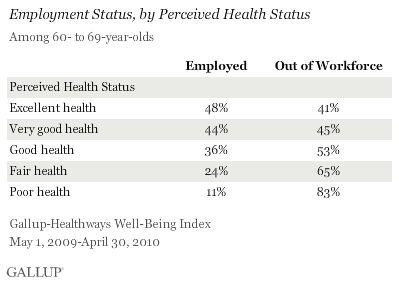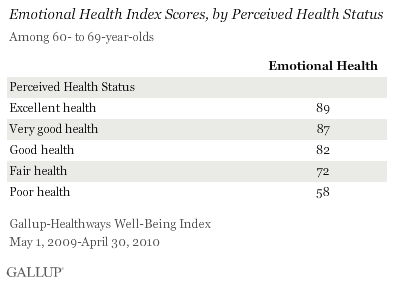PRINCETON, NJ -- Working Americans aged 60-69 have slightly better emotional health than those who do not work, according to the Gallup-Healthways Well-Being Index. This relationship is primarily evident among the relatively small numbers of Americans aged 60-69 who have fair or poor health. Among the 75% of the 60- to 69-year-old population who have excellent, very good, or good health, however, there is virtually no difference in emotional health by work status.

The current analysis is based on more than 70,000 interviews with those aged 60 to 69 conducted between May 2009 and April 2010 as part of the Gallup-Healthways Well-Being Index and Gallup Daily tracking.
Gallup classifies respondents as "employed" if they are employed full time or are employed part time but do not want to work full time. Those "not in the workforce" are not working and are not looking for or available for work. A third category, those classified as "underemployed" because they are employed part time but want to work full time or are not working but would like to work, is not included in this analysis.
According to Gallup surveys, working Americans expect to retire at older ages now than they did 15 years ago. The question remains as to whether working longer is good for these Americans' emotional well-being, or if it is a negative, particularly if those who work in their 60s are doing so primarily out of economic necessity. For some people, working provides life meaning, and retirement before it is absolutely necessary is anathema. For others, work is a negative aspect of life and they look forward to retirement as a pending psychological nirvana.
Even if modest, the overall relationship between working and emotional well-being noted previously might lead to the conclusion that working causes better emotional health. But further analysis shows that physical health is a major intervening variable in the relationship, making conclusions about causality more difficult to establish.
By way of background, the data clearly show a direct relationship between physical health and the likelihood of working among 60- to 69-year-olds.

Better physical health is also associated with better emotional health among this age group.

Both relationships hold across genders and across income groups.
These data help explain why there is little difference by work status in emotional health among those who have good physical health. Those who are physically healthy are more likely to work and more likely to have higher emotional well-being.
There is a slightly different pattern among the 25% of the 60- to 69-year-old population who have fair or poor health. The relatively small percentage of this group who are working (24% of those with fair health and 11% of those with poor health) do have better emotional health than those in these health segments who are out of the workforce. Emotional health is lower among all of these individuals in general because physical health is related to emotional health. But there appears to be a modest positive benefit of working among those with fair or poor health.
Implications
According to Gallup surveys, more than a third of nonretirees say they will retire after age 65, compared with 12% who planned on waiting that long to retire back in 1995. There are many reasons why people decide to retire when they do, including in particular economic necessity.
Whatever cause, the question of whether working is emotionally good or bad for Americans in their 60s is an interesting and important one. Some workers look forward to retirement as a surcease from the daily toll of their work, and for them, being out of the labor force could have a salubrious effect on their emotional well-being. Other workers derive much of their self-worth and meaning from work, and for them, leaving the workforce could cause a drop in their emotional well-being.
The current research suggests that for healthy workers, there is no evidence that such attitudes toward work make a difference, at least as measured by emotional health. Workers in the 60- to 69-year age range with good health have essentially the same emotional health as those who are not working. For those with fair or poor health, working does appear to be associated with slightly higher emotional health -- suggesting that for these individuals working may provide meaning or a focus outside of their physical problems.
Learn more about the Gallup-Healthways Well-Being Index.
Survey Methods
Results are based on telephone interviews conducted as part of Gallup Daily tracking with a random sample of 73,173 national adults, aged 60 to 69, living in all 50 U.S. states and the District of Columbia, selected using random-digit-dial sampling. Interviews were conducted May 1, 2009-April 30, 2010.
For results based on the total sample of national adults, one can say with 95% confidence that the maximum margin of sampling error is less than ±1 percentage point.
Interviews are conducted with respondents on landline telephones and cellular phones, with interviews conducted in Spanish for respondents who are primarily Spanish-speaking. Each daily sample includes a minimum quota of 150 cell phone respondents and 850 landline respondents, with additional minimum quotas among landline respondents for gender within region. Landline respondents are chosen at random within each household on the basis of which member had the most recent birthday.
Samples are weighted by gender, age, race, Hispanic ethnicity, education, region, adults in the household, cell phone-only status, cell phone-mostly status, and phone lines. Demographic weighting targets are based on the March 2009 Current Population Survey figures for the aged 18 and older non-institutionalized population living in U.S. telephone households. All reported margins of sampling error include the computed design effects for weighting and sample design.
The Emotional Health Index includes 10 items: smiling or laughter, learning or doing something interesting, being treated with respect, enjoyment, happiness, worry, sadness, anger, stress, and diagnosis of depression. The Emotional Health Index is primarily a composite of daily experiences. Other than the depression diagnosis metric, all remaining items ask respondents to think only about yesterday -- from the morning until the end of the day -- and consider with whom they spent it, what they did, and how they felt.
In addition to sampling error, question wording and practical difficulties in conducting surveys can introduce error or bias into the findings of public opinion polls.
For more details on Gallup's polling methodology, visit www.gallup.com.
About the Gallup-Healthways Well-Being Index™
The Gallup-Healthways Well-Being Index measures the daily pulse of U.S. well-being and provides best-in-class solutions for a healthier world. To learn more, please visit well-beingindex.com.
